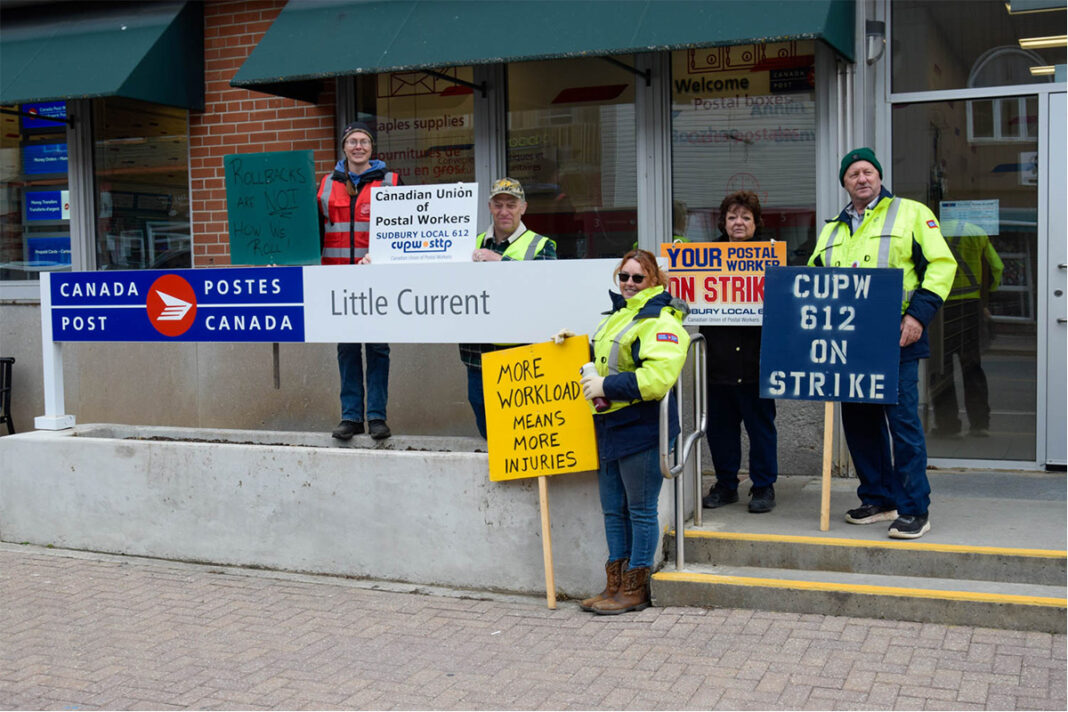CANADA—The strike between the Canadian Union of Postal Workers (CUPW) and Canada Post is entering its fourth week with little positive movement, if any, in negotiations. The special mediator appointed by the federal government in an effort to end the impasse suspended talks on Wednesday, November 27 citing those negotiations had “ground to a halt.” The strike includes 55,000 CUPW workers nationwide who deliver mail in rural and urban areas.
The strike is estimated by the Canadian Federation of Independent Business to have cost small businesses as much as $1.5 billion to date—$76 million a day—with the Crown corporation also taking immense hits to its bottom line during the busiest time of the year for deliveries. Meanwhile, striking workers are dealing with significant losses in income during the Christmas season.
Both Purolator (owned largely by Canada Post) and UPS have announced suspensions in accepting new parcels as they are being overwhelmed by the backlog.
In a concerning sign, Canada Post has laid off temporary workers in a move the union characterizes as being illegal—as workers cannot be laid off during a strike. The union filed an official complaint with the Canadian Industrial Relations Board on Friday—calling the layoffs a “clear intimidation tactic” and accusing the Crown corporation of launching an “assault” on workers. No indication of numbers has been given by either party, but Canada Post said the layoffs are temporary.
The company asserts that no laws have been broken and that the layoffs do not contravene the Labour Code. No Island workers are among those being laid off.
Canada Post issued a statement on Sunday, December 1 indicating they have “presented CUPW with a comprehensive framework for reaching negotiated agreements.”
According to the release from Phil Legault, media relations at Canada Post, the framework “includes proposals to bring greater flexibility to the corporation’s delivery model, while also demonstrating movement on other key issues. It is our hope that these proposals will reignite discussions and, together with the support of mediators, help the parties work toward final agreements. To facilitate talks, we will not be providing further details outside the negotiations process at this time.”
The release went on to note that “We understand the impact CUPW’s national strike is having on our employees and so many Canadians. Canada Post remains committed to negotiating new collective agreements that will provide our employees and customers with the certainty they are looking for.”
For its part, CUPW says the framework does not present a meaningful move forward and accuses the company of “bargaining in the media.” Both sides in the labour dispute have, in fact, submitted proposals to the special mediator that they hope will help re-start negotiations. The union chastised the company for issuing a statement on its “adjustments” before the union had any opportunity to study them.
Federal Labour Minister Steven MacKinnon has ruled out sending the two sides to binding arbitration—a stance in keeping with the NDP demand that the strikers not be legislated back to work as was the case in recent longshoreman strikes.
Meanwhile, business leaders across the country are calling for just such an intervention, given the enormous impact the strike will have during what for many small businesses is a ‘make or break’ Christmas season.
As the strike drags on, both sides have issued statements accusing the other of negotiating in the press rather than through the formal mediation process.
In a statement Sunday afternoon, the Crown corporation said that it has yet to receive a formal response from CUPW through the federally appointed mediator after its latest proposal on Friday.
“We continue to operate within a confidential process, which was agreed to by Canada Post and CUPW,” Canada Post wrote in a statement. “While we strongly disagree with the responses the union has shared publicly, we encourage CUPW to share their positions through the formal process.”
CUPW for its part said it respects the bargaining process and went on to note that its representatives met with the mediator on Saturday afternoon to discuss the proposals, which they argue contain “drastic changes and rollbacks that no union in the world would ever accept.”
Details of the proposals exchanged between the two sides during the mediation process have not been made public. Canada Post said it remains committed to getting people back to work.
“Our proposals include significant moves to close the gap on key issues like weekend delivery, pensions and wages to reach new agreements,” said a Canada Post spokesperson.
As it stands Monday, no end to the labour dispute is in sight.





